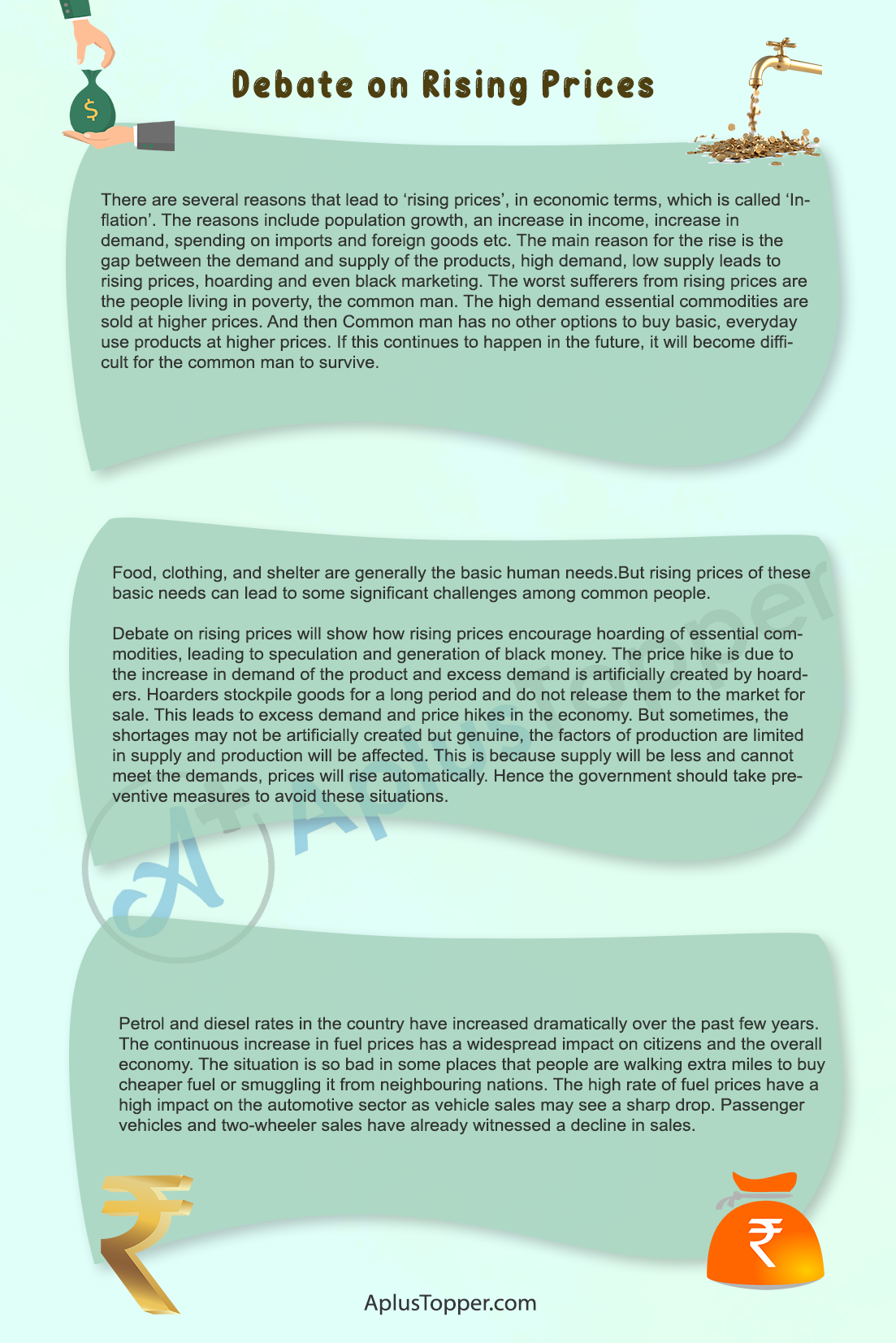Debate on Rising Prices: Honorable Judges, Respected chief guest, teachers and all my dear friends very good morning to one and all. What a pleasant morning with a lovely topic debate on rising prices to discuss. So myself Rita Ahuja would like to put forth my views in opposition to the debate on Rising prices.
Today the rising prices have deeply affected the daily life of a common man in India. It is one of the biggest issues of this country. Debate on Rising Prices is the most commonly debated topic all over the country.
Even the basic essentials such as grains, vegetables, cooking oil, etc. have been on a continuous rise in prices. Prices of daal, vegetables and everything have gone up drastically.
You can also find more Debate Writing articles on events, persons, sports, technology and many more.
There are several reasons that lead to ‘rising prices’, in economic terms, which is called ‘Inflation’. The reasons include population growth, an increase in income, increase in demand, spending on imports and foreign goods etc. The main reason for the rise is the gap between the demand and supply of the products, high demand, low supply leads to rising prices, hoarding and even black marketing. The worst sufferers from rising prices are the people living in poverty, the common man. The high demand essential commodities are sold at higher prices. And then Common man has no other options to buy basic, everyday use products at higher prices. If this continues to happen in the future, it will become difficult for the common man to survive.
Food, clothing, and shelter are generally the basic human needs.But rising prices of these basic needs can lead to some significant challenges among common people.
Debate on rising prices will show how rising prices encourage hoarding of essential commodities, leading to speculation and generation of black money. The price hike is due to the increase in demand of the product and excess demand is artificially created by hoarders. Hoarders stockpile goods for a long period and do not release them to the market for sale. This leads to excess demand and price hikes in the economy. But sometimes, the shortages may not be artificially created but genuine, the factors of production are limited in supply and production will be affected. This is because supply will be less and cannot meet the demands, prices will rise automatically. Hence the government should take preventive measures to avoid these situations.
Petrol and diesel rates in the country have increased dramatically over the past few years. The continuous increase in fuel prices has a widespread impact on citizens and the overall economy. The situation is so bad in some places that people are walking extra miles to buy cheaper fuel or smuggling it from neighbouring nations. The high rate of fuel prices have a high impact on the automotive sector as vehicle sales may see a sharp drop. Passenger vehicles and two-wheeler sales have already witnessed a decline in sales.
Debate on Rising prices have also highlighted the plight of the wage-earners, rising prices have adversely affected the economic conditions of fixed-income groups, the wage earners. Rising prices lead to increase in the inequalities of incomes, because with every rise in prices, producers and traders are able to fetch larger money. Whereas the people with fixed incomes i.e., wage-earners and salaried employees cannot. The consequences of rising prices are thus very harmful.
The continuing rise in prices adversely affects the consumption of the weaker sections of the population.
Through this debate on rising prices I would like to highlight that the government must empathise with the plight of the poorest of the poor and take some necessary actions to take preventive measures to regulate the prices of essential commodities from rising.
In this debate on rising prices, I strongly cling to my view that rising prices have an adverse effect on the life of a common man. Government must take subsequent measures to control inflation.
Government should come up with adequate mechanisms to increase the production of essential commodities to meet the rising demands. Hoarding and black marketing should be regulated and the needs of the common man should be looked into before exporting products to other countries. With this, I conclude my debate on rising prices.
Thank you.

FAQ’s on Debate on Rising Prices
Question 1.
What should be the measures taken by the government to regulate rising prices?
Answer:
The government has to take measures to not to revive growth in the economy, but also to manage rising prices so as to protect the poorest of the poor. This can be achieved through a single solution, which is to raise wages for the poor. It would not only help create demand to stimulate growth, and also lead to an increase in consumption by the poor.
The Finance Minister urged that urgent and timely attention be given to all matters related to price rise, and ensure smooth flow of essential commodities available in the market through dehoarding, timely inspection, monitoring, etc.
Question 2.
What causes inflation?
Answer:
Inflation causes due to an increase in production costs or an increase in demand for products and services.
- Inflation rises due to increases in production costs, such as raw materials and wages.
- Due to the huge demand for products and services, consumers are willing to pay more than the actual price for the product, which causes inflation.
- Some companies take advantage of inflation if they can charge more for their products as a result of the high demand for their goods.
Question 3.
What are the factors responsible for rising prices?
Answer:
The factors which have influenced the increase in the price level are the following: Rapid Growth of Population, Increase in Incomes, rising non-development expenditure of the government and increase in money supply, inadequate industrial output, inadequate agricultural output and also high-priced imports.
